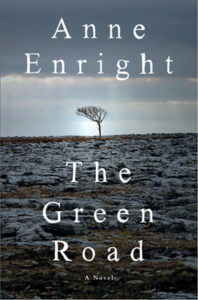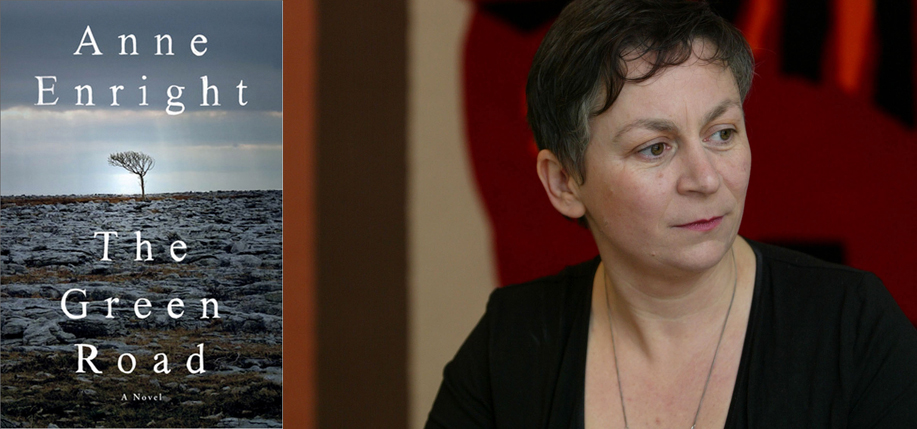Anne Enright was born in Dublin, where she now lives and works. She has published three volumes of stories, one book of nonfiction, and five novels. Her 2007 novel, The Gathering, won the Man Booker Prize, and her novel, The Forgotten Waltz, won the Andrew Carnegie Medal for Excellence in Fiction. She is currently the inaugural Laureate for Irish Fiction. Her most recent book, The Green Road, is a tale of family and fracture, compassion and selfishness – a book about the gaps in the human heart and how we strive to fill them.
℘℘℘
What is your current state of mind?
I am pretty bushed after doing a televised interview and two radio shows at a literary festival in Hay on Wye, which is on the border between England and Wales. This is, perhaps the eleventh town I have been to in the last three weeks, in Ireland, Britain, the U.S. and Canada. I have lost count, actually. But it has been great to return to places where I have read before – wonderful independent bookstores like Politics and Prose in Washington and The Harvard Bookstore in Cambridge, Massachusetts. I can’t believe I am still here, still hitting some of the markers I am hoping to hit: each new book is as hard or as engaging as the last, and you never know how it will all work out. It is also interesting to find myself older and a bit wiser. The last time I was in this beautiful little town I was lonely and slightly lost, looking for connection, wondering who was in the bar. This time I am happy to walk in the sunshine, go back to the bed and breakfast, make tea.
Your greatest extravagance?
The most expensive thing I ever bought was my career as a writer. Writing is the only job where you earn money in order to do it, and not the other way around. For the first fifteen years or so I supported my fiction with other work. It is a luxury, and it is an extravagance, and it is a rivilege to work doing something you love, which expresses and enhances your most authentic self.
Do you have a hero in real life?
I am all for ordinary people. There is always something to admire.
Who is your favorite fictional hero or heroine?
I do “protagonists” not “heroes.” My favorite characters are flawed.
What is on your bedside table?
Melatonin tablets, bought in a U.S. pharmacy and taken back over the pond to get me over the jetlag. I am in a dotey, traditional house in Hay, with wisteria over the door and the most surprising and beautiful garden out the back, full of fruit trees and shrubs, with a vegetable patch and grapes growing up against a red brick wall. So English, and yet so real.
Your earliest memory?
I remember my cot as a baby.
It was built by my father and painted blue with special lead-free “nursery” paint. I reached between the bars and tore the wallpaper away in strips from the seam. I don’t know when this
happened, exactly. My first dateable memory is of a pot stand beside a step in a holiday cottage when I was eighteen months old. In the distance is a woman in a chair. She has white hair. It is my Granny and she is reading a book. My mother, as I discovered later, has gone to hospital with my eldest brother, who broke his collar bone that year. I think I am about to upset the pot stand. Both these memories are silent, tranced, slightly furtive.

Did you read a lot as a child? And if so what was your favorite book or author?
I read everything I could get my hands on at home and from the library beside my school in Rathmines, Dublin. My mother wanted me to love Wind in the Willows, a book she had adored as a child, but I was an Alice In Wonderland sort of girl. To be more precise, my favorite book was Alice Through the Looking Glass.
When did you begin to think of yourself as a writer?
Hard to say. I have kept everything I wrote from the age of thirteen or fourteen, so it must have started around then.
How does your own family react to your fictional family. Do they accuse you of writing about them?
No. Because I don’t.
Best advice ever received?
My mother has great advice. Many years ago she advised me against offending people’s religious beliefs. She said, “If someone worships a stone in the road, and you laugh at them, they will pick it up and hit you with it.” I don’t know how useful this advice has been to me personally, but it does show how truly smart my mother can be.
You did a brilliant job of switching of narrators in The Green Road – how did you conceive the structure of the book?
I think I improvised for the first year or so. Messed about. Inched along. Somewhere in there, the structure I needed became apparent, and I began to stick to it.
When you are teaching, what was your favorite book to assign and discuss with your students?
I love talking about Raymond Carver’s story “Fat.” It is a tiny, glancing moment in an ordinary life – a waitress feels great empathy for a fat customer; her boyfriend laughs at her for it and she has a sense that her life is, somehow, about to change. We don’t know if her life will change, but we love her for wanting something better. Hardly anything happens in this story, and yet it is very moving.
Do you strike up conversations on long plane journeys?
Yes I do. But only towards the end. I also talk to taxi drivers and random strangers. This evening a little girl sang a lullaby for me in a café, all in Welsh. It made me very happy.
Do you have a hidden talent?
After two weeks of interviews I don’t know if anything I have is hidden. I can touch my toes. I can actually put my hands flat on the floor. Is that a talent?
Favorite country you have visited?
I am pretty much against the idea of “favorite” anything. I like new things, new places, new books, food, perfume. I don’t settle or make lists. Judging things, organizing them, just wears me out.
What books do you find yourself returning to again and again?
I return often to the poetry of my youth – Yeats, in particular.
Is it true that Irish women writers don’t get the same attention as men? (I’m thinking the Field Day Anthology first volume, which had no women). And if so, why?
Well that is a million dollar question – if we knew why women were so excluded then we could fix it. Calling Irish men out on their misogyny seems a bit rough when Irish men are so nice. I suspect that Irish anxiety about the female voice starts very early. I mean it is not sexualized. Irish men aren’t freaked by their girlfriends, but by their mothers. And what man wants to listen to his mother?
What do you do to relax and clear your head?
I walk by the sea. Sometimes it is hard to stay out of it, indeed, and I have a swim. Water fixes everything for me.
What’s next for you?
Sleep, car, plane, car, The Listowel Writer’s Fest- ival (which IS my “favorite”) in County Kerry. ♦


Leave a Reply